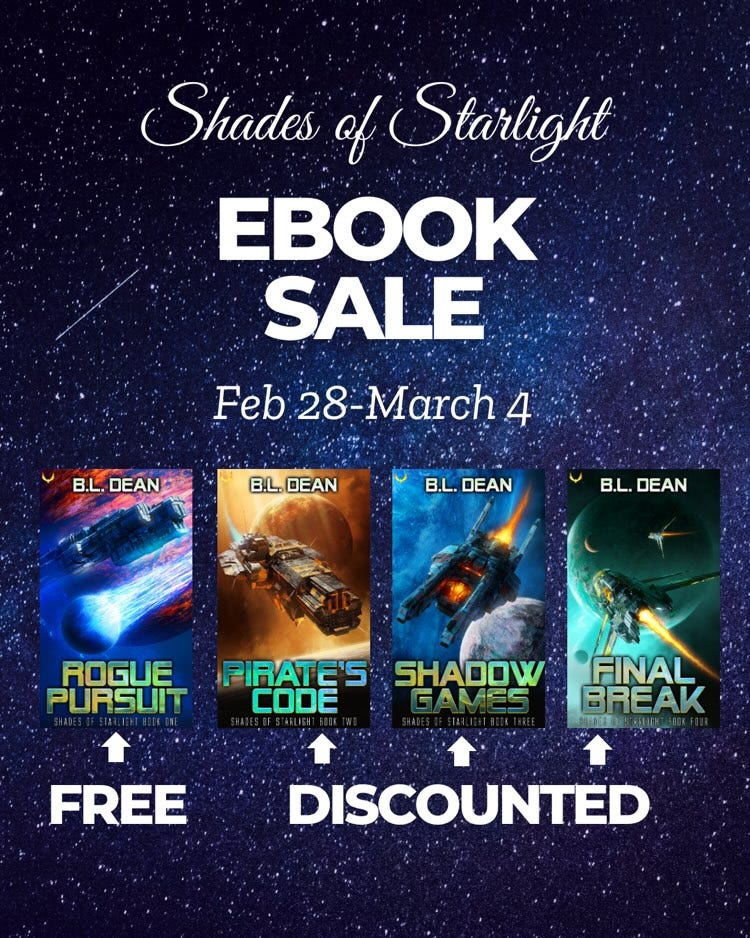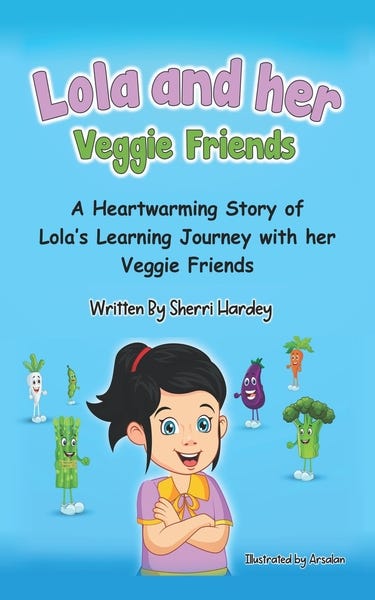In today’s issue… Lot’s of Things!
Why I won’t boycott Kindle essay
B.L. Dean Shades of Starlight ebook sale
Top Five Sitcoms
FREE copy of Lola and Her Veggie Friends by Sherri Hardey
FREE Short Story of the week: The Garbage Collector
The first real signs of spring are starting to show. The frost is fading, the days are getting longer, and soon, the world will shift from gray to green again. It’s that time of year when the gardening itch kicks in—when I find myself staring at packets of seeds, making plans for the raised beds, and debating whether this will finally be the year I keep up with the weeds.
There’s something hopeful about planting a garden. You dig into the dirt, bury something small, and trust that with enough care, it’ll grow. That, given time and the right conditions, something will take root.
Maybe that’s why I’ve been thinking so much about the state of books, publishing, and the ongoing debates about where and how we buy the stories we love.
Lately, I’ve seen a lot of people calling for a boycott of Kindle.
I get it. I really do. Amazon has made it clear that when you buy an ebook, you don’t technically own it in the way you own a physical book. You’re paying for access, not possession. And for people who believe in the importance of owning what they buy, that’s a frustrating reality. A corporation controlling access to your personal library? It’s unsettling.
But here’s the thing—boycotting Kindle doesn’t affect Amazon.
Amazon will be just fine. They aren’t going to flinch if a handful of readers stop buying ebooks from their platform. Their profits won’t take a hit. Their business model won’t change. Jeff Bezos isn’t going to lose sleep over it.
You know who will feel it? Authors. Especially indie authors.
Who Really Gets Hurt?
For independent authors, Kindle isn’t just a convenience—it’s survival. Amazon controls the vast majority of the ebook market, and for indie writers, Kindle is where most of their sales happen. The Kindle Unlimited program allows authors to get paid for pages read, giving them a chance to earn income even if readers aren’t buying books outright. Many authors rely on these earnings to keep writing, to pay their bills, to stay afloat in an industry that is already brutal.
The truth is, publishing isn’t in a great place right now. Sales are sluggish. Traditional publishers are acquiring fewer books. Indie authors are seeing smaller returns. In this kind of climate, pulling support from Kindle isn’t some grand act of resistance—it’s just another hit to the people who are already struggling the most.
Would I love for Amazon to rethink its stance on ebook ownership? Sure. Would I love for authors to have more control over their work and how it’s distributed? Absolutely. But refusing to buy books on Kindle doesn’t move the needle on those issues—it just makes it harder for the writers I care about to make a living.
How I Choose to Support Authors
So, no. I won’t be boycotting Kindle.
What I will do is continue supporting my friends, my fellow writers, and the authors who are feeling the pinch of an economic downturn and an already tough market. I’ll buy their books, leave reviews, and recommend their work. Because at the end of the day, my loyalty isn’t to a corporation—it’s to the people creating the stories that matter to me.
Books—like gardens—need nurturing. They need readers willing to invest in them, to give them space to grow. And right now, the best way to support the authors who need it most isn’t by making a statement against Amazon. It’s by showing up, buying their books, and helping their work reach more people.
Spring is coming. Things will grow. And I’d rather spend my energy planting something meaningful than tearing something down.
One of my closest friends (and by closest, I mean she’s part of my highly secretive author fellowship—a tight-knit group of nine of us who support, vent, and scheme together) is having an AMAZING ebook sale over on Amazon.
Her publisher has seriously slashed the prices—Book 1 is FREE, and Books 2 & 3 are just $0.99 each. If you love great stories and incredible deals, now’s the perfect time to grab them!
My Top Five Sitcoms
Each week, I share a list of favorites—books, shows, or whatever else I’m into. I’ve already ranked my Top Five Fantasy Novels, my Top Five Late-Night Snacks, and my Top Five Science Fiction Shows. But this week? We’re talking sitcoms.
Because few things hit quite like a great sitcom. The kind that feels like comfort food. The kind you can throw on after a long day, knowing it’ll make you laugh no matter how many times you’ve seen it.
So here they are—My Top Five Sitcoms:
5. Cheers
Where everybody knows your name—and somehow, even if you weren’t alive when it first aired, it still feels like home. Sam, Diane, Coach, Norm… every character was iconic, every joke landed, and the Boston bar setting was the perfect backdrop for some of the sharpest sitcom writing of all time.
4. The Office
The mockumentary that changed everything. Awkward silences. Cringe-worthy moments. Michael Scott trying way too hard. Whether you love it for Jim and Pam, Dwight’s beet farm, or Kevin’s chili disaster, The Office set the gold standard for modern sitcoms.
3. Parks & Recreation
At first, people thought it was just The Office with government employees. But then it became so much more. Leslie Knope’s relentless optimism. Ron Swanson’s disdain for people. Andy Dwyer’s lovable stupidity. It started strong and only got better—by the end, Parks & Rec had built one of the most heartwarming sitcom casts ever.
2. The Big Bang Theory
Love it or hate it, The Big Bang Theory dominated sitcoms for over a decade. It took nerd culture mainstream, gave us a theme song we’ll never get out of our heads, and somehow made theoretical physics… funny? Sheldon, Leonard, Penny, and the gang kept us laughing for 12 seasons—and no matter how many reruns air, people still keep coming back.
1. Friends
The sitcom. The blueprint. The show that defined an entire generation. Friends had everything—perfect casting, endlessly quotable lines, and the kind of chemistry most sitcoms dream of. Whether you were rooting for Ross and Rachel, laughing at Joey’s antics, or just here for Chandler’s sarcasm, Friends wasn’t just a TV show—it was a cultural moment.
Sitcoms come and go, but these? These are the ones that never get old.
What’s your favorite sitcom? Let me know in the chat!
Are you looking for ways to encourage your child to be interested in their health?
This ebook by Sherri Hardey is free. It’s a heartwarming story of Lola's learning journey with her Veggie Friends.
Get your FREE copy of Lola and Her Veggie Friends
LAST FRIDAY’S FREE SHORT STORY! ENJOY!
The Garbage Collector
David stepped off the edge of the garbage truck and lifted the lid from the small aluminum can. He squeezed his eyes shut, fighting back the tears and bile caught in the back of his throat. The last time he’d smelled something this bad, he’d been fighting Slug Monsters in the War of ’96. Man, those slimy bastards had stunk.








I hadn’t heard of a kindle boycott, but I boycott Amazon every day. The only things I buy from Amazon are books by indie authors. I like authors more than I dislike Bezos. I also like promoting our own. I like that there are Christian books in every genre to inspire people to walk by faith. God obviously was a supporter of stories, so shouldn’t we be, too? I also like that books give me an excuse to stay away from the ungodly crap coming out of Hollywood. Books are better entertainment!
I won’t be boycotting Kindle altogether, but I’ll definitely be putting my own books wide and shopping for other authors wide first too. (And returning to buying physical books for the most part, also not from Amazon.) Maybe it’s just me being optimistic, but I do hope there’s a day soon where Amazon doesn’t dominate the industry.